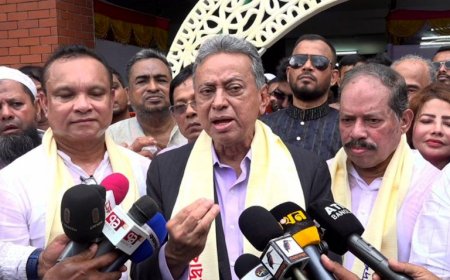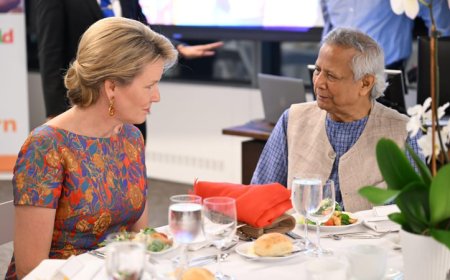Trials must be a "pursuit of justice, not a thirst for blood," says Cadman
Trials must be a "pursuit of justice, not a thirst for blood," says Cadman

Toby Cadman, the newly appointed Special Prosecutor Advisor to the International Crimes Tribunal (ICT) by the Bangladesh government, has emphasized that the upcoming trials must be free from political interference and the settling of old scores. He stated that prosecutorial decisions should be "based solely on evidence, not on vengeance or political expediency."
A UK-based specialist in international criminal law, Cadman further told Prothom Alo that there should be "significant changes" to both the law and the rules of procedure governing the tribunal, to ensure that "crime definitions are clearly articulated and fair trial guarantees are upheld." He also mentioned that he would not hesitate to provide "robust advice" on necessary changes. However, it remains unclear whether Cadman, appointed on Monday, has had the chance to review and advise on the final version of amendments to the International Crimes (Tribunal) Act of 1973, which were approved in a meeting of the advisory council on Wednesday.
Earlier this week, the tribunal "showed arrested" 13 politicians and 8 senior officials of the former Awami League government, accusing them of crimes against humanity and genocide related to the deaths of protesters and others during the July-August period. It is reported that law enforcement killed over 1,500 people during the three-week period, though no conclusive list has been published yet.
Asif Nazrul, the Law Advisor, mentioned that Cadman was appointed to support the prosecution team. "Given his expertise and experience, he has been appointed to strengthen the prosecution. The defence also has the right to appoint foreign lawyers," he said.
Cadman is known in Bangladesh for his strong criticism of previous trials at the ICT from 2011, during which he was part of the defence team representing Jamaat-e-Islami leaders prosecuted and convicted for international crimes committed during Bangladesh's 1971 independence war. Several of the convicted individuals were later executed. In August 2011, after the trials began, the Awami League government barred Cadman from entering Bangladesh.
Speaking to Prothom Alo, Cadman stressed the importance of learning from past mistakes.
“The trials now must be everything that the previous trials were not,” he said. “Defendants must be granted all the fair trial guarantees that the previous defendants were denied. It must be a thirst for justice, not a thirst for blood.”
He acknowledged that conducting the trials properly without political interference would be more challenging, time-consuming, and costly, but emphasized that this was the only way to ensure fairness. He added, “These trials will be under significant scrutiny, and that must be recognized.”
With over 20 years of experience in international criminal law, Cadman dismissed concerns that his previous role as a defence lawyer for Jamaat would hinder his ability to achieve the objectives of fairness and justice in these trials.
“It is crucial that this work is done properly and that prosecutors act independently and impartially. That is my commitment. I have no personal agenda and will ensure that individuals who bear criminal responsibility are fairly prosecuted, regardless of their political affiliation or any other factor,” he affirmed.
Cadman explained that his role involves assisting and advising the Chief Prosecutor "in preparing and presenting cases before the International Crimes Tribunal," as well as coordinating international support and offering advice on the legal framework.
In September, Cadman visited Bangladesh and met with Mohammed Yunus, members of the student movement, the Law Adviser, and the Attorney General. He stated that during these meetings, he "discussed the need to reform the judiciary and re-establish the rule of law."
"It was clear to me that there is a strong desire for justice—a desire to hold accountable those who have committed grave violations of international humanitarian and human rights law and to do so properly," he said.
Cadman plans to spend a minimum of 60 days in Bangladesh over the first 12 months but will also work remotely. He confirmed that he has agreed to take up the role on a pro bono basis, meaning he will not be compensated.
What's Your Reaction?





















































































